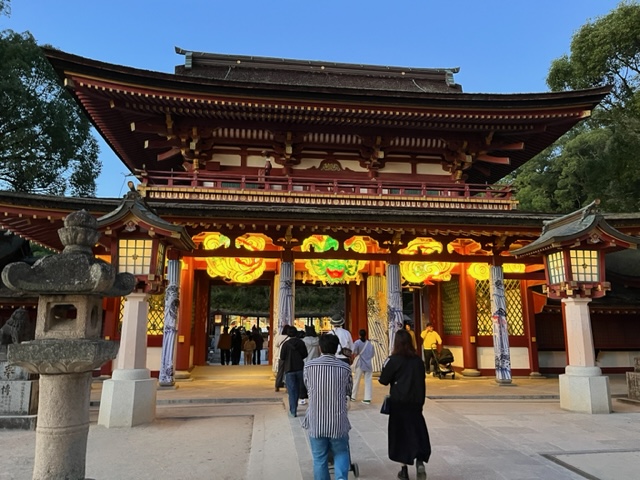
letters-home-november-holidays-in-japan
There are two national holidays in Japan during the month of November.
The first one occurs on Nov. 3 and it commemorates the announcement of the Japanese Constitution on Nov. 3, 1946. Today, it is widely referred to as “Bunka no hi” or “Culture Day,” a day set aside to reflect upon peace, freedom, and culture. Culture includes traditional culture, academia, and the fine arts of Japan. Most commonly, celebrations are more “recognitions” and often include art exhibitions, parades, and even prestigious award ceremonies for artists and scholars.
Since 1936, an imperial award ceremony has been held on this day called the “Order of Culture.” Presented personally by the Emperor of Japan, it recognizes the work and efforts of those who have achieved great success or made great advances in the areas of scientific research and the arts, like literature, music, or academia.
The nice thing about this award is that it is not only given to Japanese citizens, but can also be awarded to non-Japanese. For example, it was awarded to the Apollo 11 astronauts after their trip to the moon. The ceremony is held at the Imperial Palace in Tokyo and it is quite the formal affair.
When I lived in Hirosaki, Aomori, the city would shut down the main street downtown and vendors would open booths where people could stroll the street perusing all the wares on display. I think there was also a parade during some years. Cities choose a variety of ways to commemorate this holiday but generally something related to culture is accentuated on this day. Often times, people will visit local temples and shrines on this day to honor “culture.”
The other November national holiday in Japan is Labor-Thanksgiving Day on Nov. 23. Primarily, this is a day to recognize laborers and workers, including farmers who cultivate the rice harvest, so that is where the “thanksgiving” aspect comes into play, which is very different from the Thanksgiving Day celebrated in the U.S. around the same time.
The Japanese holiday began in 1948 and was set aside to recognize workers for all their hard work. Called “Kinro Kansha no Hi” in Japanese, it had its origins in an ancient ritual called Ninamesai, which was a harvest festival that dates back to the year 678.
During the U.S. occupation of Japan after World War II, there was a push to change Shinto-based holidays to secular ones, but often times the new holiday coincided with the date of a traditional one since people were already used to having a holiday at that particular time.
The main purpose of this holiday is to show gratitude to workers, in other words, being thankful for workers and laborers who work hard and do their jobs well. Often times in train stations or other public areas, elementary students’ artwork will be displayed. These are often in the form of thank you cards with drawings of police officers, fire fighters, medical personnel, teachers, etc., where the children express their gratitude to those who work in the public arena.
I always appreciate and enjoy how creative some students are in their depictions of these workers and how they individually interpret what it is the workers do in their professional jobs.
While Labor-Thanksgiving Day isn’t really a political holiday, it is an opportunity for labor unions to publicly discuss worker’s rights, unions, and the labor movement in general. If the day happens to fall on a Sunday, then the following Monday is celebrated as a day-off where people do not have to go to work, and public and governmental offices are closed, as well as banks.
Because this Japanese holiday occurs close to the American celebration of Thanksgiving, and since it is a national holiday, many Americans will get together to try and have an American-style Thanksgiving feast.
This year, the U.S. Thanksgiving is on Nov. 23, so I am sure that there will be many get-togethers of U.S. citizens and their friends to try to recreate some sort of traditional U.S.-inspired Thanksgiving feast. It is tricky because while you can find turkey in Japan, it tends to be very pricey and Japanese ovens are rather small so it isn’t easy to roast a big turkey.
That’s not to say it can’t be done, though. I have attended many U.S.-styled Thanksgiving feasts in Japan over the years. One of my favorites was at a friend’s, who also owns an English school. She and her husband invite their foreign friends, along with their many Japanese friends and students to have a traditional Thanksgiving feast. While they supply the turkey, and many of the traditional fixings, it was a “pitch-in” so everyone brought food to share, so it always had an interesting and delicious mixture of Western foods and Japanese dishes.
I usually took deviled eggs, which are not normally served in Japan, but Japanese people seem to love them. After the meal, we would stand around her baby grand piano while her son, who is a professional musician, would play holiday songs and we would all sing. I think we also expressed what we were thankful for over the past year.
Another rather amusing and very unofficial holiday that some people casually celebrate in November is “Good Couple Day” which is always on Nov. 22. This is basically a play on words related to the date.
Since November is the eleventh month and depicted as “11,” this sort of looks like “ii” which means “good” in Japanese; “22” can be read as “fufu” which means “a married couple.” So, when combined, it can be read as “ii fufu” or “good couple.”
Again, this is not a real holiday in the true sense of the word, but it is a cute way to recognize married couples and it gives a couple a chance to exchange gifts on a day other than their anniversary. I have no idea how many couples actively celebrate this made-up holiday but I suspect it is very few. Likely, most people have trouble remembering their wedding anniversaries if married for a long time, so it would be harder to expect a spouse to remember a date in November to celebrate their marriage, unless their anniversary falls on Nov. 22, in which case there is no excuse not to give some sort of a gift to your spouse.
I hope everyone who celebrates either the U.S. or Japanese Thanksgiving holiday had a wonderful holiday, filled with rest and relaxation, and lots of good food!
Get the most recent Shelby County Post headlines delivered to your email. Go to shelbycountypost.com and click on the free daily email signup link at the top of the page.





